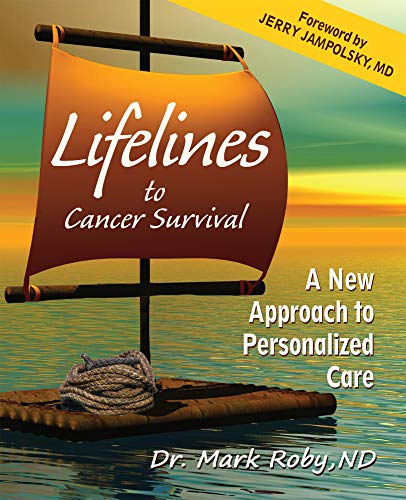BIRMINGHAM, MI (PRWEB) DECEMBER 09, 2015
Each day in the United States, close to 1600 children and adults – enough to fill four jumbo jets – die of cancer. More than 4000 are newly diagnosed.
Mark Roby was almost one of those fatal statistics.
But he beat the odds. Roby’s new book, “Lifelines to Cancer Survival,” is a one-of-a-kind guide that offers patients cutting-edge, novel approaches to personalizing their own care. Diagnosed with one of the world’s rarest cancers (liver and lungs) in 2002, Roby was given four months to live. He visited oncologists around the country and they all told him to enjoy whatever time he had left. He has done everything he can to prove those doctors wrong—and today he’s alive and well. He put what he learned in his book.
“I was told I could either do nothing, or receive very high doses of interferon, a very potent chemotherapy, as palliative care. That was the standard of care,” says Roby.
He went for the chemo and ended up in the hospital with severe side effects. The drug didn’t work. “As a medical professional myself, I realized I would have to redefine and rethink what I would need to do in order to survive,” says Roby.
And survive he has. But how? Why is his story different from the countless others diagnosed with terminal cancer?
ROBY DISCOVERED PERSONALIZED CARE
His first turning point came when he met with a researcher/oncologist at MD Anderson in Houston, Texas for a consult. The researcher advised Roby that to stay alive, he would have to go beyond the standard of care. Roby would need to:
- Make survival his priority, including researching his own tumor
- Create three contingency plans to have on the table at all times
- Use advanced biomarkers to guide his treatment
So, first he took charge of his own care, becoming an incessant researcher himself and enlisting the aid of whomever would help him.
Secondly, having three backup plans reduced some of Roby’s anxiety by knowing what he could try next, instead of scrambling when some treatment didn’t work. As part of this “Triad of Survival,” Roby searched for novel cancer treatments based on his own tumor’s makeup, and pushed for their use. If the doctors he was seeing didn’t approve, he found someone who did. There were new drugs, clinical trials and even foreign chemotherapy, illegal in the United States. Some worked, and some did not, yet Roby continued his quest.
Thirdly, Roby used blood and genetic biomarkers (such as VEGF/angiogenesis, inflammatory markers, and molecular growth pathways) to help doctors guide his treatment.
After a liver transplant, Roby’s cancer returned. He went to Boston for a molecular profile of the tumor, a test he had been told for years would be a waste of time and money. He was put on a new drug targeting the tumor’s genetic pathway to stop further growth.
“There were three genetic abnormalities,” Roby explains. “I asked my team at Cleveland Clinic to target the main one, and I’ve been good ever since. They took my research seriously.”
GAME CHANGER FOR CANCER PATIENTS
“Lifelines to Cancer Survival” arms patients with novel options for survival, much different than what most medical centers are offering. In it, Roby provides critical, cutting-edge information for cancer patients, including strategies, websites, labs that perform advanced testing, and a list of eclectic oncologists.
“It’s about survival,” Roby states. “I wrote the book because there are lots of different ways to fight different malignancies and nobody knows about them. It’s a guide that will help cancer patients find safe, more effective care.”
Learn more about Mark Roby’s Cancer Survival Story on his My Story page.

